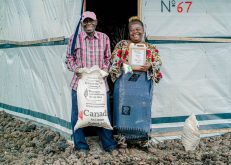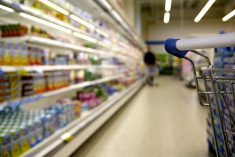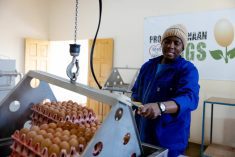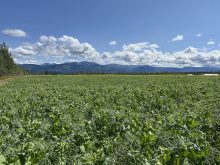Having “conquered the desert” at home, Israel is ready to share technology and skills with African countries struggling to sustain agricultural output due to increasingly unreliable rains, an Israeli minister said.
Shalom Simhon, Israel’s minister of agriculture and rural development, said sharing know-how, especially in irrigation and water management, was his focus on a tour of Senegal, Ivory Coast and Gabon.
His trip comes as some 10 million people in West and Central Africa face food shortages due to failed rains.
“We are not arriving here in Africa to take resources from the African countries. We are coming here in order to give know-how and abilities to these countries to develop,” Simhon told Reuters while in Senegal.
Read Also

Mazergroup’s Bob Mazer dies
Mazergroup’s Bob Mazer, who helped grow his family’s company into a string of farm equipment dealerships and the main dealer for New Holland machinery in Saskatchewan and Manitoba, died July 6 from cancer.
“Israel is the only country in the world that has been able to conquer the desert. More than 50 per cent of our exports are coming from semi-arid areas. This is our strength – this we would like to bring here.”
Simhon said Israel could help Senegal reduce dependence on imports, which currently account for around 80 per cent of food needs. “Senegal’s traditional agriculture is one crop a year. We know how to do three and four crops a year. We can teach that.”
The minister would not give any figures on proposed Israeli aid to African farming or detail the role of Israeli companies in such programs. Already Senegal hosts several Israeli-funded projects looking at using low-pressure drip irrigation to increase productivity.
“WORLD DRYING UP”
Israeli farmers have been heavily involved in modern developments in irrigation, including drip irrigation systems and water recycling methods.
Some experts believe these techniques could become invaluable in Africa’s arid growing regions, which risk becoming increasingly vulnerable to climate change.
“One of the most important things is the water technology and usage. The world is drying up. There are less water, there is less rain days,” Simhon said.
“In Israel we are using recycled water, desalinated water, rain water, salty water, which almost anywhere in the world will not have any use for (but) we (use to) make the sweetest tomatoes,” he added.
Simhon said advances in technology had allowed Israeli farmers to use 30 per cent less water while almost doubling output over the last decade, leaving the country with a 150 per cent food surplus.
EU Seeks Global Plan For Farm Investments
European Union governments want to develop a global code of conduct for foreign investments in agricultural land in developing countries, according to a draft paper on food security seen by Reuters.
Food security concerns, driven by a sharp rise in global food prices in 2008, have prompted major importers such as China and the Gulf states to invest heavily in African farmland to secure supplies.
Campaigners have also said the 27-country EU’s target to increase the use of agro-fuels in road transport has increased demand for crops and fuelled so-called “land-grabs” in developing nations.
EU nations will call for “the development and implementation of principles and a code of conduct governing sustainable large-scale investments in land,” the draft paper, due to be adopted by EU foreign ministers in May, said.
Campaigners ActionAid criticized the paper for seeking to limit the code of conduct to “large-scale investments.”
“What is needed is a code of conduct on all types of land investment, not just large-scale ones,” ActionAid policy officer Anne-Catherine Claude said.
The European Commission asked EU governments to help develop “international principles for responsible investments in agricultural land” in developing countries in a policy paper on food security published in March.
Member states will “financially support
national and regional agriculture and food security policies and strategies,” and “scale up EU funding for comprehensive programs on chronic and acute malnutrition,” the paper said.


















